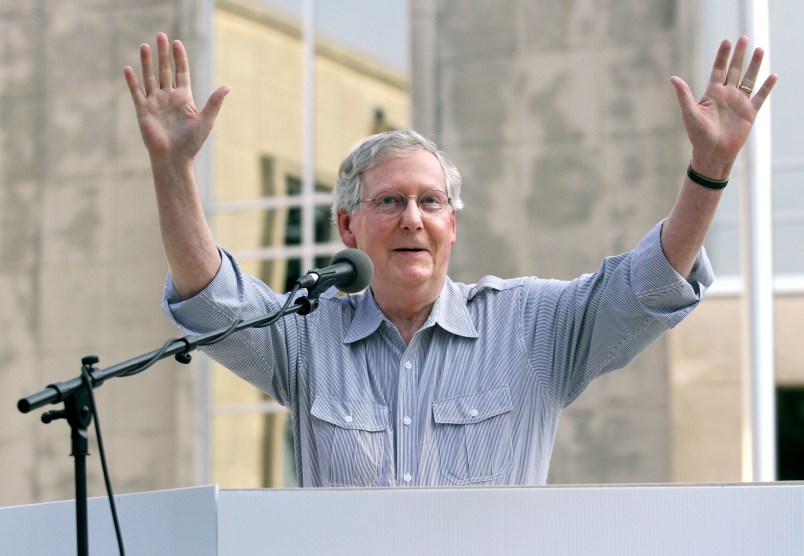Like geese flying south, Republicans stumbling leftward is a reliable sign of autumn.
Rep. Tom Cotton, running to flip a Senate seat to the GOP, announced he would vote for a state-level minimum wage hike in Arkansas. He said he would vote for it “as a citizen,” but said he would oppose a Senate minimum wage bill if elected, as he opposed an amendment that would raise the minimum wage in the House in 2013. Arguing with exactly no one, he insisted that he was opposed to the minimum wage being a “ceiling,” as though he was unclear on the concept of “minimum.”
And in Colorado, you’d be forgiven for thinking that Rep. Cory Gardner is going to start showing up to events in a Loestrin-branded t-shirt, given his newfound love for contraceptives. North Carolina’s Thom Tillis is jumping on board, too.
Even Mitch McConnell, angling to be the leader of a new Republican Senate, is trying to earn a few points by, grudgingly, not ruling out the general concept of a higher minimum wage.
Now that primary season is over and more people are paying attention to politics, Republican candidates are stepping out from the closed circle of Republican primary voters, right-wing donors and conservative media, into the world of the general electorate, and they’re reacting accordingly, by pretending to have a different set of priorities, concerns and positions than the ones they just took.
If it sounds familiar, it should be.
In 2012, President Obama didn’t turn in a great first debate performance. At least a little bit of the problem, though, is that the opponent he was expecting didn’t show up. Instead, First Debate Mitt Romney seemed to have stepped out of a time warp from Massachusetts in 2002. He attacked Obama from the left on financial reform, insisted his tax proposals wouldn’t cut taxes for the rich, and claimed his health care plan would cover pre-existing conditions.
The “severely conservative” primary candidate had checked out, and Autumn Mitt showed up for the home stretch.
In 2012, it didn’t make a difference; we never had to see what President Romney would be like. This is a different year, with a smaller map, to be sure.
Why do Republicans always have to resort to this? Because they spend most of their time answering to a much smaller and much more conservative constituency. To get themselves to autumn, nearly every Republican has to go through a gauntlet of right-wing institutions to get press coverage, money and eventually votes. Even when the “establishment” candidate wins, they’ve had to prove their right-wing bonafides, so even when they don’t win the battle, tea party conservatives win the war. The people who rise to the top of this process are bound to be “severely conservative,” and they know how they got there.
When a national spotlight hits them, all the promises they had to make in that small arena look a little embarrassing.
Mike Coffman got an early opportunity to see what things are like outside of the bubble. In redistricting, he ended up in a district that gave Obama 52 percent, rather than the 39 percent his old district did. His rhetorical shift to the left is particularly empty: he wanted to get credit for “evolving” on immigration, without having to prove it by voting yes, because Boehner never introduced a bill for him to vote “yes” on.
Republicans don’t need a wave or big wins in blue states to do well this cycle, so it’s striking to see the seasonal migration happening anyway. Even Arkansas and Kentucky, coming off of a string of Republican-leaning election cycles, aren’t so far to the right as the people Cotton and McConnell had to answer to first — to whom they have very different things to say about the minimum wage.
Of course, we know what sorts of legislators Gardner and Cotton will be, because we have their voting record in the House, and the tight party discipline in Mitch McConnell’s caucus as strong evidence.
Don’t trust the guys who show up in September. Pay attention to who they’ve been all along.
Seth D. Michaels is a freelance writer in Washington, D.C. He’s on Twitter as @sethdmichaels.







Saying that GOP candidates are moving leftward is like saying a KKK member going to a tanning salon will have a better understanding of the plight of black people in America.
“GOP Candidates Dart Leftward”
Yep, lets get all those video clips from the primaries out and start making ads for the Democrats. “Before and after” comparisons are always fun to watch.
“Rep. Tom Cotton, running to flip a Senate seat to the GOP, announced he would vote for a state-level minimum wage hike in Arkansas. He said he would vote for it “as a citizen,” but said he would oppose a Senate minimum wage bill if elected, as he opposed an amendment that would raise the minimum wage in the House in 2013.”
Ummmm, ok, no matter how I look at that, it makes absolutely no sense.
Those democrats and their lack of clearly defined values, sheesh, they flip flop on every issue whereas we republicans always…wait … what was that about OTC contraceptives? And that minimum wage deal?
Jeebus…I’m confused…
(snark)
Sure, we’ll believe that candidates like Cory Gardner who STILL have their names on the federal “personhood” bill in the United States House of Representatives, a bill that would OUTLAW most forms of birth control, now want the same birth control available over the counter…Give us a break, Gardner is a liar and a certified snake oil salesman!